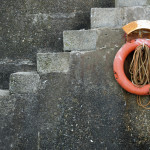2014 was a bad year for ice in Austin. On January 28 there were 270 crashes between midnight and 6 a.m. And even though,
as I write this, the weather’s lovely in Austin (except for all the insidious Cedar pollen), Dallas is being hit with what seems like constant mini earthquakes and Houston has its hurricane season. Point being, I’m thinking about natural disasters and how, often, companies have no natural disaster plan.
Unless you’re in some place like Los Angeles that’s used to earthquakes or someplace in Oklahoma that deals with a lot of tornadoes, you might not even think to make a natural disaster plan. But you should. Because after one hits is a really rotten time to think it through.
What happens, for example, if we have another patch of icy days and your employees can’t make it into work? Or if work is under six feet of water? Do you have a strategy in place? The morning that everything hits the fan is not the time to start pondering what happens to your company if no one can get into the office. So before that happens, you might do well to consider some of the following:
• What are you covered for? Dallas businesses might not have thought to get earthquake insurance before, but maybe it’s a good idea now that earthquakes are nearly a daily occurrence—and sometimes a several-a-day occurrence. And in my years of living in Austin, I remember many times when a section of Lamar Blvd. in Austin got flooded so that cars were floating down the street. The question is, what are you covered for? Is it adequate? Does it cover employees heading into work during inclement weather? Does it cover floods and fires? Do you know who to call?
• How do you let employees know? Let’s say it’s like last January 28 and the highway patrol is begging people to stay home and reduce the number of accidents on the road. Do you have a plan to contact employees? It could be an email or texting notification, a social site all employees are on, a phone tree or a phone number where they can hear a recorded message. The important thing is to have a plan in place to let people know that work is canceled or starting late.
• How do you let customers know? This, of course, will depend on your business. But it’s a good idea to think about it, whether you have a storefront or corporate office.
• Who absolutely has to be at work? Of course some of your employees may be able to work remotely. Possibly all of them can. But is there anyone who has to be on site or else the company is shut down for the day? Do you have a plan for that person to get to work when transportation is nearly impossible? Do you have a contingency plan with someone who lives closer? What are your options?
• What do you do about the missed days? So, because there was a terrible flood or ice or whatever, employees could not get to work. Is that part of their paid time off? Will they have an opportunity to make up the time? Do they get paid or not? These are things you should decide well in advance. You need to have rules decided for exempt and non-exempt employees and include the rules for those who can work from home and those who can’t.
Better safe than sorry. It’s no fun to have to shut down your business but you don’t want to be demanding employees come in if doing so would put them in harm’s way. So make sure to tell employees to consider their safety when deciding whether to come in.
It could be the worst disaster we face this winter is prodigious pollen count. Wouldn’t that be nice?
We work with companies on a project basis or on retainer, providing a custom level of HR help designed for your business. Contact me at Caroline@valentinehr.com or call (512) 420-8267.




